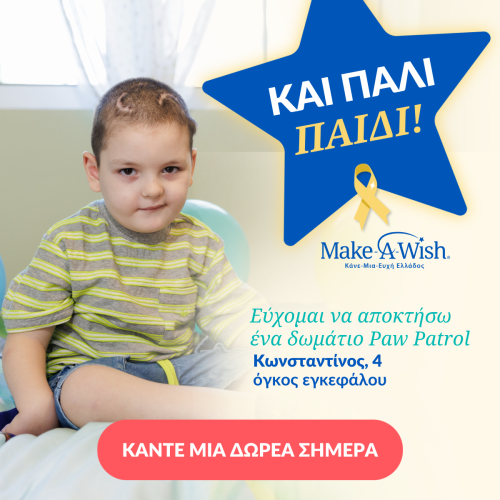Hospitalisations, treatments, examinations…
More than 1,000 children are diagnosed with cancer every day.
Childhood cancer is a silent enemy that steals innocence and hope, leaving behind a shadow of anxiety and fear. According to the World Health Organization, more than 1,000 children worldwide are diagnosed with cancer every day. From the moment of diagnosis, they are forced to part with their friends, their home, their daily routine, and their playtime to dedicate themselves to long and exhausting treatments.
However, in this darkness there is a ray of light: the wishes we grant! Every wish granted by Make-A-Wish Greece restores a precious piece of lost childhood and rekindles hope and faith that anything is possible! This Gold September, we are shining a light on an unseen side of childhood: The psychology of children with cancer.
*Source: CureAll framework:
WHO global initiative for childhood cancer
The psychology of a child with cancer
By Nasia Fanti, psychologist and person-centred psychotherapist
In the “journey” of a child with cancer undergoing treatment, their mental health can be significantly affected and is certainly unstable. It goes through different stages and phases depending on the course of the disease, which makes their support by professionals essential and beneficial for a child, throughout this difficult journey.
Hospitalisation, especially for a child, is a traumatic experience for both the child and the family. It is a fact that children who are hospitalised, especially if the hospitalisation is for a serious condition such as cancer, experience high levels of emotional instability and anxiety. From one moment to the next, the child is forced to leave behind his daily routine, friends, home and school – essentially their sense of security – and loses normalcy and part of his childhood.
According to Hilary Marusak (2018), these “psychosocially stressful” situations experienced by a child patient during the course of the disease can accelerate the onset of a mental disorder and may even influence the overall course of the illness. It is therefore important to understand how children perceive the treatment and its impact on their bodies and lives, and to help them develop a more positive attitude towards it.
Healthcare professionals often expect the child to be quiet, obedient, not to get upset, not to cry, to accept medical care without complaint, to stay in bed. These expectations – combined with the limitations imposed by the illness and treatment – can lead to passivity in the child and adolescent, with potentially serious negative psychological consequences, especially if the hospital stay is prolonged.
Papadatou (1997) points out that the child needs to be encouraged to look to the future with optimism and to participate personally in the management of their illness and treatment, with the aim of promoting and consolidating their autonomy. At the same time, according to research published in the Journal of Clinical Oncology, the quality of life of cancer patients is directly linked to the emotions they experience when faced with their disease. Patients who had and maintained a more positive attitude to life also appeared to have better outcomes.
We know from neuroscience that serotonin strengthens the immune system and reduces stress levels in humans. On this basis, a more positive psychology towards experience and illness leads to higher levels of serotonin in the body, which contributes to better stress management and improved depressive mood, which helps to improve the outcome of illness, as well as more favorable biochemical test results.
It is therefore extremely important that the mental and emotional world of the child and adolescent with cancer is given the same attention and care as the physical disease.
There are many times when a child in hospital presents an image of total resignation, as if the exhaustion of the treatments and the hospitalisation stoled his confidence and the belief that he would succeed, so that he sinks deeper, sees no point in continuing to try and thus delays his discharge from hospital.
At this time, more than ever, we need to remind the child of what he or she has achieved so far, but also to look to the future, to all the beautiful and pleasant things that are still waiting to be experienced and realised. This can be achieved through activities, even within the hospital – such as film showings, arts and crafts, music therapy, creative play, painting, writing and storytelling – that help the child to process thoughts, fears, worries and feelings, but also to reconnect with a piece of childhood ‘normality’ that will give them the motivation to come back and continue their efforts.
In addition to all of the above, Make-A-Wish Greece, a personal favorite, is a guaranteed, optimistic “tool” to help in a meaningful way. As the unit’s psychologist, I am delighted to have the responsibility of informing children – and their parents – of their fantastic “right”, to Make-A-Wish! Amidst the flood of medical and bureaucratic information, the existence of the possibility of a wish and the journey towards it, is a new fact, a condition that brings pleasant surprise and excitement.
But more than that, the journey of wish granting is something that motivates the child to think, to imagine, to dream, to escape from the hospital’s daily routine, to wander into dreams and wishes that may have seemed unattainable until recently. It’s a break from the treatments, the transfusions, the drugs. An occupation, an activity, to spend time “outside” the hospital, even though they remain in it. Something to look forward to, something pleasant, something desirable, something that keeps the enthusiasm and optimism alive until it is achieved, something that motivates the child to continue to fight, to wait for their own wish to be granted, to feel safe, to feel like a child again.
Nasia Fanti is a Psychologist and Person-Centered Psychotherapist. Since 2019, through the Association of Parents and Guardians of Children with Neoplastic Diseases “Pisti”, she has been working as a Psychologist – Psychosocial Care Manager at the Bone Marrow Transplant Unit of the Children’s Oncology Hospital “Elpida”, providing psychosocial care to children with the disease and their families and liaising with the Child Psychiatric Clinic of the C. Hospital “Aghia Sophia”, collaborating institutions and NGOs.


